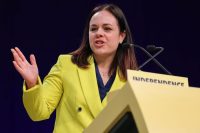When Russell Findlay stood to be Scottish Conservative leader, he talked the familiar language of ‘change’. I predicted that this would translate to a rightwards shift for the party and his first major speech in the job confirms it. Findlay is not entirely comfortable with the ‘right wing’ label – he is a Tory, after all – but it is the readiest descriptor of the positions he is setting out.
Since he took over in September, the Tories have become the only party in the Scottish parliament to oppose free bus travel for asylum seekers, additional aid for schools in Africa and early prisoner releases to tackle overcrowding. Findlay says:
Left-wing parties at Holyrood point to our opposition to the mass early release of hundreds of prisoners. When our concerns are perfectly normal around most kitchen tables. Commentators criticise our supposed right-wing view that the Scottish government should fix Scotland’s schools before sending millions for education in Africa. That’s not right wing, it’s simply right for parents and pupils in Scotland. We’re also criticised because we don’t think asylum seekers should be given free bus travel – especially when pensioners are losing lifeline winter fuel payments. To most families in Scotland, that view is right, not right wing.
These positions may not be controversial among the general public but in the ideologically sealed ecosystem of Scottish politics, they are hostile invaders from an alien world. Holyrood is the custodian of those soft-left pieties that animate Scottish public life, from a dreary collectivism that idolises the state and admits no failing or need for reform to the superstition that Scotland is uniquely egalitarian and humanitarian. No politician ever wanted for votes who was willing to tell the Scots that ‘aye been’ was radicalism in action.
So it is with some courage, or perhaps foolhardiness, that Findlay takes aim at goodies beloved by the Scottish middle classes, such as free university education, free prescriptions, and the baby box (a stash of free supplies for new mothers). They might be more sympathetic to his call for lower taxes, but the combination of the two marks Findlay out as a cuckoo in the Holyrood nest. His first big speech even broached the need for public sector reform, a statement of the obvious but so energetically avoided by all the other parties that it sounds almost daring.
Findlay’s instincts are similar to those of Kemi Badenoch, the likely new leader of the UK Conservative party. Neither is especially conservative, both being adherents of economic liberalism, and it is an open question as to whether the Tories can thrive in a populist era while hewing to the fiscal policies of the managerial Westminster elite. In many cases, where right-wing and nationalist parties are prospering in Europe it is on policy platforms that would be anathema to British Tories. European populists typically don’t want to shrink the state, they want to use it to their own ends rather than those of their progressive foes. Populism offers to serve your interests by disregarding the interests of others, be that big business, immigrants, minorities, or refugees. Tory liberalism says your economic interests are interconnected with those of others and that through sacrifice and prudence, and in the fullness of time, everyone’s interests will be served. Regardless of which approach is right, one is plainly simpler and more tempting, especially in times of scarcity and hardship.
One of Russell Findlay’s chief concerns is attracting back those Tories who defected to Reform in the general election and contributed to the party’s worst night in Scotland in almost two centuries. Setting himself up as the scourge of Holyrood lefties is his best bet of returning these electors to the Tory column in time for the 2026 devolved elections. Beyond that, however, lies the question of how to convince others, including those who have never cast a ballot for the Tories, to give them fresh consideration. Findlay must do what Ruth Davidson did and build a new electoral coalition for the Scottish Conservatives but he must do so without the issue that formed the backbone of Davidson’s strategy: opposition to independence. Even the SNP hardly talks about independence these days. Findlay will need a strategy all of his own, one capable of assembling and retaining a voting bloc of boomercons, squeezed middle-earners and aspirational young couples who need it to be just a little bit easier to get ahead. And he has to do it knowing that, even if his party could somehow get into power in Edinburgh, there is almost no money to do much of anything.
Findlay and Badenoch should be trading notes. They both have a daunting task ahead of them.








Comments